#Vegan diet sustainability
Text
The Ethical Vegan Diet: More Sustainable Future

Introduction:
The ethical vegan diet is gaining popularity for its focus on compassion and sustainability. Ethical vegans abstain from consuming animal products, aiming to eliminate harm directed towards animals while supporting a more environmentally-friendly food system. This article will delve into the principles of Ethical vegan eating, highlighting the ethical and environmental consequences of animal agriculture. Furthermore, we will explore the health benefits associated with adopting an ethical vegan diet and provide practical tips for implementing this lifestyle choice.
The Ethical Implications of Animal Agriculture:
Animal agriculture is a primary contributor to various ethical dilemmas surrounding animal rights. The factory farming industry subjects animals to overcrowded, unsanitary living conditions and inhumane treatment. Ethical vegans argue that all sentient beings have an inherent right to life, freedom, and protection from unnecessary suffering. By avoiding animal products, ethical vegans refuse to support an industry that promotes cruelty and exploitation.
Additionally, the widespread use of antibiotics and hormones in animal agriculture poses significant health risks. Routine use of antibiotics leads to the emergence of antibiotic-resistant bacteria, jeopardizing public health. Ethical vegans advocate for a food system that prioritizes the well-being of both humans and animals, highlighting the need for a shift towards plant-based alternatives.
Environmental Benefits of Ethical Veganism:
Beyond ethical concerns, adopting an ethical vegan diet also has significant environmental benefits. Animal agriculture is a major contributor to deforestation, greenhouse gas emissions, and water pollution. Livestock farming requires vast amounts of land, leading to the destruction of ecosystems and loss of biodiversity.
Furthermore, the process of rearing animals for food is extremely resource-intensive, requiring substantial water usage, feed production, and transportation. Animal agriculture is responsible for a significant portion of global greenhouse gas emissions, primarily due to methane released by livestock. By choosing to consume plant-based alternatives, ethical vegans reduce their carbon footprint and contribute to a more sustainable future.
The Health Aspect of Ethical Veganism:
Contrary to common misconceptions, an ethical vegan diet can meet all nutritional requirements. Well-planned vegan diets can be nutritionally adequate and provide all essential vitamins, minerals, and macronutrients needed for optimal health. Plant-based diets are rich in fiber, vitamins, and antioxidants, which can help in reducing the risk of chronic diseases such as heart disease, diabetes, and certain types of cancer.
However, to ensure adequate nutrient intake, ethical vegans need to pay attention to certain nutrients like vitamin B12, omega-3 fatty acids, iron, calcium, and zinc, which are commonly found in animal products. These can be obtained through vegan-friendly fortified foods, supplements, or careful selection of plant-based sources.
Practical Tips for Adopting an Ethical Vegan Lifestyle:
Transitioning to an ethical vegan diet can be a gradual process. Start by incorporating more plant-based meals into your routine and experimenting with various fruits, vegetables, grains, and legumes. Educate yourself about plant-based nutrition and seek guidance from registered dietitians or nutritionists to ensure a balanced diet.
Explore the wide variety of vegan alternatives available, such as tofu, tempeh, seitan, lentils, and nut-based milks. Experiment with different cooking techniques and flavor combinations to discover delicious plant-based meals.
In addition to diet, ethical veganism extends to the use of animal-derived products like clothing, cosmetics, and household items. Opt for cruelty-free and vegan alternatives whenever possible, avoiding products that have been tested on animals or contain animal-derived ingredients.
Conclusion:
Adopting an ethical vegan diet aligns individual food choices with moral principles, promoting compassion for animals and environmental sustainability. Through eliminating animal products, ethical vegans prioritize the well-being of all sentient beings and minimize their environmental impact. By understanding the ethical implications of animal agriculture and acknowledging the numerous health benefits associated with plant-based diets, individuals can make informed choices that promote a more compassionate and sustainable future. Please visit here Ethical vegan eating for more information.
#Factory farm animal cruelty#Vegan diet benefits#Unnecessary meat consumption#Dairy industry dangers#Meat industry hazards#Animal abuse in agriculture#Health benefits of veganism#Climate change and meat#Antibiotic resistance farming#Ethical vegan eating#Sustainability and veganism#Plant-based protein sources#Deforestation and meat industry#Debunking protein myth#Meat#dairy health risks#Greenhouse gas emissions farming#Dairy industry animal cruelty#Vegan diet sustainability#Environmental meat industry costs#Animal welfare and veganism
1 note
·
View note
Text
The Ultimate Vegan Guide: Nourishing Body and Soul with Plants
Picture this: It’s 7 PM on a Sunday evening. You’ve recently decided to go vegan. Your stomach grumbles as you open your refrigerator, only to realize that your dinner options are limited to wilted lettuce and a lone tomato. Sounds disastrous, right? Well, welcome to the crash course in veganism: understanding why some dive headfirst into plant-based heaven while others stumble and fall.
1. The…

View On WordPress
0 notes
Text
vegans r so right actually
#like as a meat eater veganism is the way fr#like meat consumption + production isn’t do us any good for the most part#of course meat has its benefits like protein (even tho u can protein from a plant based diet)#but how is meat consumption & production even sustainable in the future ?#i just don’t think it is idk#& just bc humans have been eating meat since forever doesn’t mean it’s good#anyway#sexlapis talks#i’m telling u if fake meat tastes good i will at least go vegetarian
38 notes
·
View notes
Note
the insistence of some vegans that all animal agriculture is 100% horrible for the environment and all plant agriculture is 100% good infuriates me. some biomes cannot support plants with enough digestible calories to feed an adequate number of humans per acre! but many of those biomes CAN support plants that can feed a cow/sheep/goat/etc that can be turned into digestible calories for humans! we just need to know what land is best for what purpose, and ideally (this being the hard part that requires cultural and political change), minimize the shipping distance of both plant and animal products so that we're mostly eating local. sorry for the vent, you probably already know all this, it's just SO FRUSTRATING.
100%
It's about managing our ecosystem and balancing our agricultural pursuits to work *with* not *against* the environment, not cutting out a massive portion of our subsistence.
#veganism#ecology#agriculture#we are adapted for diverse diets that match our diverse environments#one diet for everyone isn't sustainable#environmentalism
75 notes
·
View notes
Text
It's so funny how I used to be a rigid vegetarian for years but I have never thought something was too cute to eat like I'll bite a cow it's true cute things taste better come here
#creepy chatter#I can't relate to vegetarian/vegans when they :( post about how cute pigs are#Yeah they're very cute. Their flavor game is ridiculous as well.#I just went back to eating meat to try gaining weight and also I never stopped dreaming of hot wings#I just really like vegetables and I didn't eat the meat from school and it bled into all of my diet eventually#Green beans can sustain a man for 2 weeks#A pig will sustain much longer
45 notes
·
View notes
Text
went to the farmers market and bought my veggies for the week :)
#everyone back in class/the lab/whatever thinks im vegan#they dont know im too forgetful to get the chicken tenders out of the freezer#anyway i really enjoy going to the farmers market.#i was too young to properly understand why was everything so expensive1 back home (literally the edge of the world)#but here i can sustainably base my diet on veggies... thank god for local rural areas#tessas txt
22 notes
·
View notes
Text
Why Is Arnold Schwarzenegger Vegan?
Introduction
Why is Arnold Schwarzenegger vegan? This question piques the curiosity of many, given Arnold’s iconic status as a world-renowned bodybuilder, actor, and former governor. Known for his extraordinary physique and strength, Arnold’s switch to a vegan lifestyle seems contrary to the stereotypical image of a meat-consuming bodybuilder.
This article delves into Arnold Schwarzenegger’s…

View On WordPress
#animal welfare#Arnold Schwarzenegger#celebrity vegan advocates#environmental advocacy#environmental impact of diet#ethical eating#fitness industry#health benefits of veganism#plant-based diet#plant-based protein#strength and veganism#sustainable farming#sustainable living#vegan lifestyle#veganism and muscle building#Why Is Arnold Schwarzenegger Vegan
3 notes
·
View notes
Text
i’m gonna need vegans to quit pretending that 1) we can solve all our problems by switching to a completely meat-free diet and 2) we can all collectively and easily do so without facing any consequences or complications whatsoever
#rory yells at cloud#like. even ignoring the fact that we are natural omnivores who need a healthy balanced diet#veganism IS NOT SUSTAINABLE for everyone on the planet and should not be treated as such#not to mention it doesn't magically solve the issues in the food/farming/agriculture etc. industries. far from it#of course we should improve on those issues! but veganism is not the magic instant perfect fix you all pretend it is
13 notes
·
View notes
Text
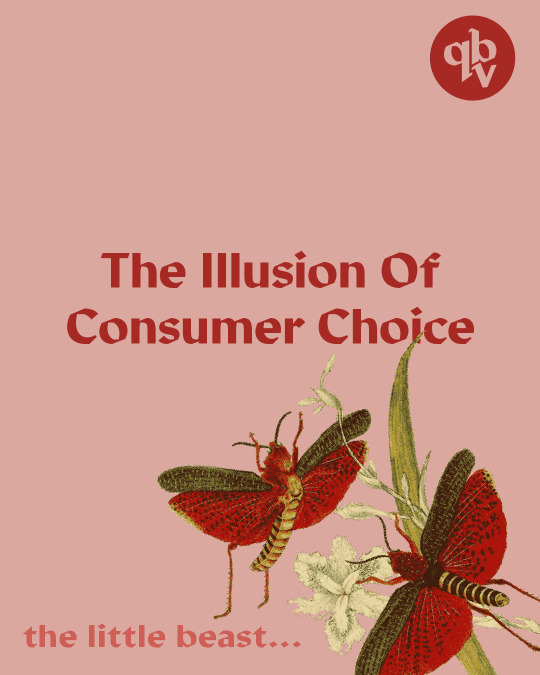
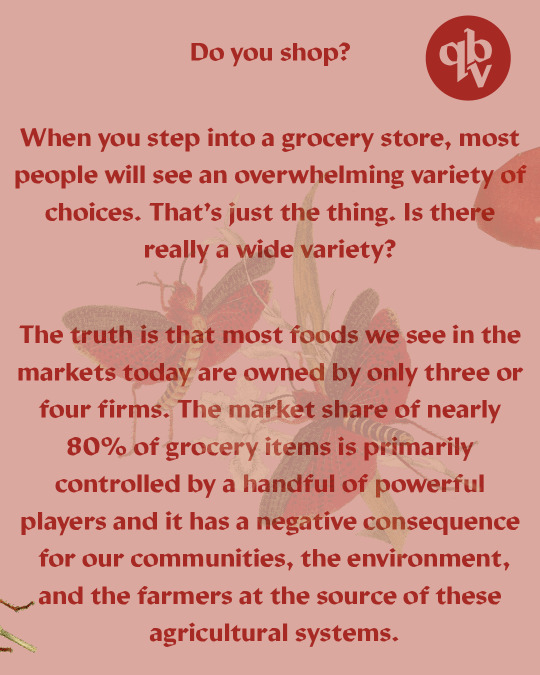
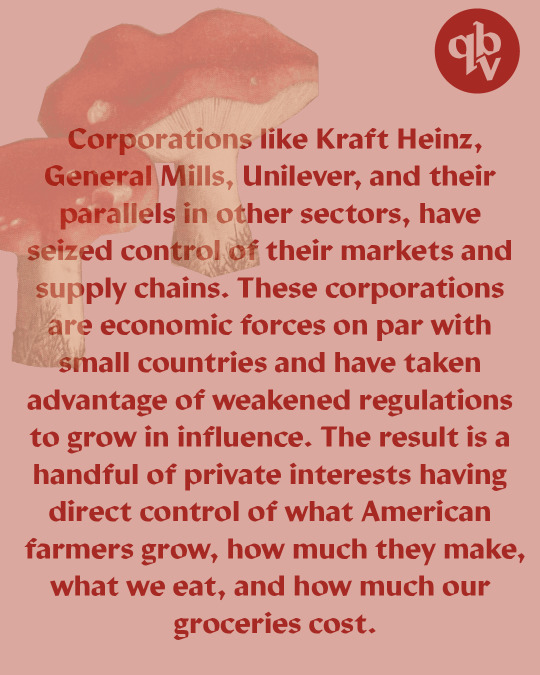
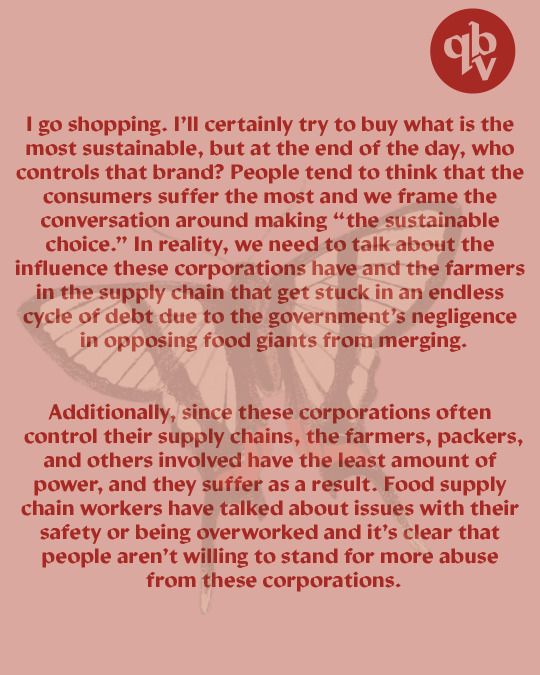
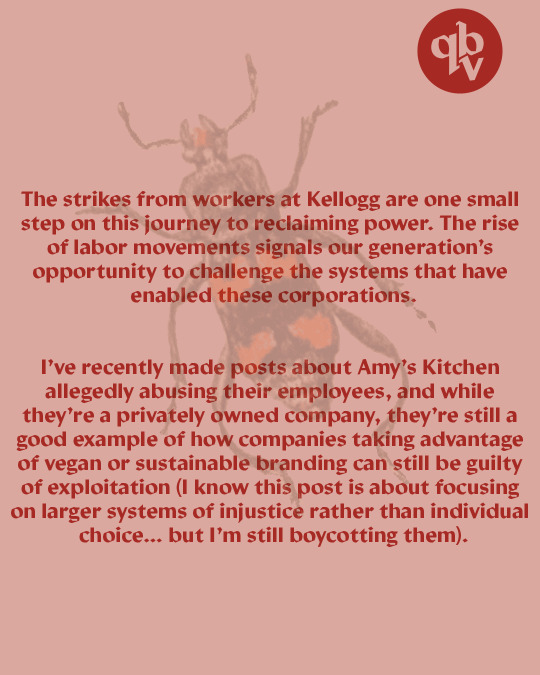
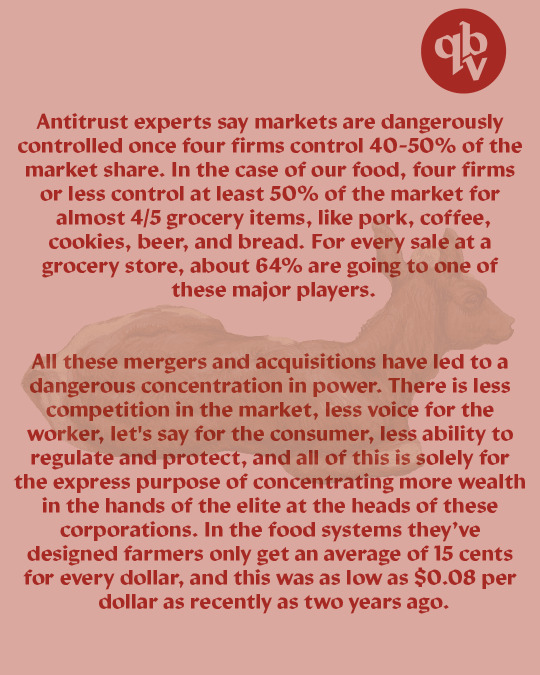
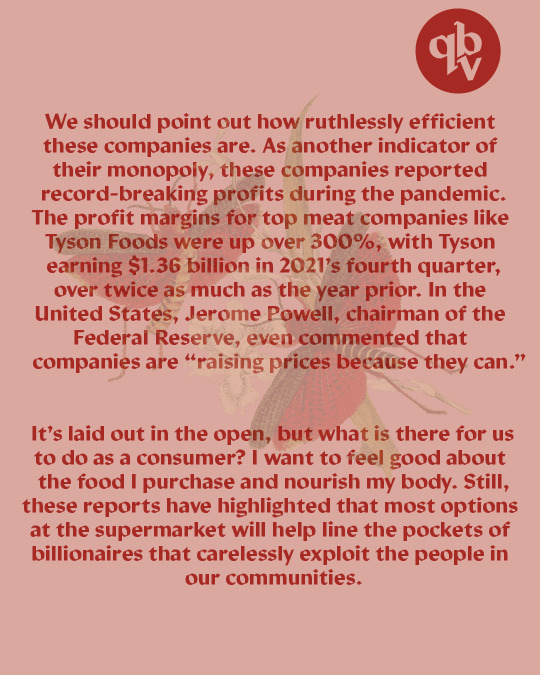
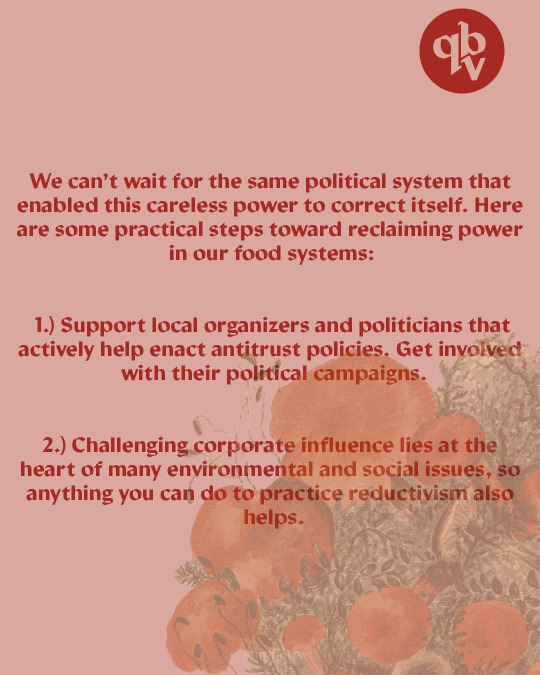
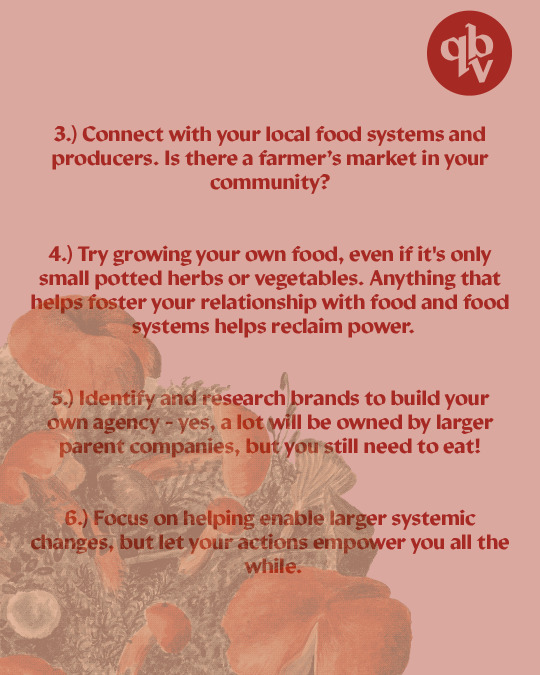

The Illusion of Consumer Choice
You cannot buy your way out of harmful systems, but I still advocate for reductivism. Explore how you can shift out of exploitative systems, but do not sacrifice your well-being because that will lower the level of support you can give to your community. Do not try to solve global problems at your local grocery store if it will put you into financial or personal disarray. Our problems are far bigger than simply what we buy at the grocery store and as such we must set our sights on the beliefs and economic systems that perpetuate injustices.
#food#diet#vegan#vegetarian#veganism#queerbrownvegan#writing#blog#climate change#global warming#sustainability#ecofriendly#environmental#sustainable#capitalism#late stage capitalism#fuck capitalism#justice#food justice#social justice#environmental justice
21 notes
·
View notes
Text
youtube
How Herding Evolved into Capitalism, Slavery, Sexism, and more!
#v#dr. will tuttle#mindful consumption#mindful livingmin#mindfulness#holistic leveling up#leveling up#that girl#green juice girl#late stage capitalism#consumerism#the world peace diet#wfpb#whole food plant based#sustainability#animal exploitation#animal liberation#environmentalism#plant based lifestyle#veganism#fitblr#ethical consumption#food centric herbalism#sidewalkchemistry#Youtube
2 notes
·
View notes
Text
just realized i had a fully vegetarian day of eating without trying, which i’ve probably done before but this is the first time i feel like i actually got enough protein too without being like intentional about it. im pretty excited even though it wasn’t all vegan, one meal was and the other wouldve been easily veganize-able if i had vegan cheese. and like as someone who used to be such a picky eater i had a list of foods i’d have to introduce into my diet before being able to even THINK about eating vegan, it’s exciting to see i’ve done enough of that introduction that i can have a day of low-effort eating that’s unintentionally vegan-approaching. like i forget how limited my diet used to be until i actually examine what my current diet looks like and go whoa i wouldn’t have eaten like 2/3rd of this even just a year ago lol. and tbh i dont know if i ever intend on going fully vegan but my goal is to limit myself to maybe cooking with meat and/or dairy only once or twice a week, and the only animal product to keep a staple would be eggs (i want to have my own chickens.)
#unfortunately it’s too easy for me to fall into an orthorexic mindset and trigger unhealthy restriction and binging#and i know vegans say ‘veganism isnt a diet it’s a lifestyle’ but#it’s really not lmao it quite literally is about what you eat and ‘diet’ doesn’t mean ‘fad diet’ or ‘weight loss diet’#it’s just what you eat and unfortunately changing it drastically can b triggering#which is why for now i’m focused on slow#sustainable dietary changes#and an additive mindset of trying new vegan dishes#or introducing ingredients that ive been picky about that are vegan staples#rather than eliminating meat or dairy#maybe once i have a larger repertoire of vegan meals and find it easy enough to meet my protein needs#then i can start deliberately limiting my animal product intake#but also i think about i forget who on radblr has this stance but basically#the idea that veganism shouldnt be encouraged to women because so many of us already have iron deficiency and are more prone to it from#our periods and as women are also more likely to have histories of disordered eating#and are more prone than men to a feeling of individual moral responsibility and guilt#which i think is an interesting argument i do kind of agree and it’s why i dont feel the immediate pressure to go vegan even as some#of my vegan friends guilt me lol#like im sorry im gonna prioritize my health#but i do agree that ULTIMATELY a diet LOW in animal protein is most supportive of physical health even with the above considerations about#anemia and women’s protein needs on their periods#like yes those are good reasons to be critical of some of the popular high carb unsustainable vegan influencer diets#but a diet of mostly plant based protein sources with minimal animal based protein where iron absorptionis a concern is ultimately going to#be more supportive of ur general health than a diet high as high in red meat as the standard american diet#anyways those r my thoughts lol idk where i was going in these tags
6 notes
·
View notes
Text
proves my exact point that those ppl dont actually gaf about the problems caused by those individuals or anything like that, they just want someone to be high and mighty over and in many cases i think feel guilty about confronting the idea that their diet (like pretty much everyones in the west) has negative repercussions for the environment and other human beings too. like dont make that my problem that u need to convince urself ur saving the world by eating beef burgers lol
#i love the genre of post thats like nuts/quinoa/soy/etc is bad#like mhhm and only vegans eat those things#99% of the market share of ppl buying almonds is vegans#and they should just be eating processed beef flown in from the amazon instead<3#like if ur diet isnt solely sustainably farmed/hunted local meat then u getting mad at vegans really flopped im sorry#if it was really about the things ur claiming then youd be focusing on making ur own diet more sustainable and ethical#rather than just making up a hypothetical vegan who loves microplastics and deforestation and food miles but wont eat cheese
3 notes
·
View notes
Text

I assume that some of you have seen the MSC (Marine Stewardship Council) label before. It's a label for sustainable fishing, so it's only found on fish products of responsible origin. Excluded, therefore, are practices that cause overfishing and the destruction of marine habitats. According to the FAO (Food and Agriculture Organization of the United Nations), 89 % of important fish populations worldwide are either maximally used, overfished, or collapsed. So it's of great importance to know how one's personal fish purchase does not contribute to environmental destruction. Since 1950, human influence has eradicated 90 % of large predator fish populations like salmon, tuna, and cod.
MSC was founded 1997 as a collaboration between Unilever and WWF, and has since then become an independet international non-profit organisation. But it's a subject of harsh criticism.
The first, and most important point of critique, is that the label is handed out too early in the certification process. As soon as a first set of standards is fulfilled, the label is acquired, even if this only consists of plans for the implementation of sustainable practices. The first step is an action plan for how the fishing endeavor will be run sustainably in the FUTURE. Even though the fishing isn't sustainable yet, the products already carry the MSC label.
A different point is that the label can be acquired in spite of desctructive fishing methods, like the use of bottom trawl nets.
Another point is the certification of practices that come with a large amount of bycatch. This bycatch does by no means include a small number of endangered individuals!
Even overfished populations get certified. 2015 there were at least 5 MSC-certified fish populations that counted numbers underneath their safe biological limit!
The organisation claims to be independent, but looking at the business year 2015/16, a whole 73 % of its income came from certification purchases, and only 24 % from non-profit donations. The organisation's incorruptibility is to be questioned.
The last point of critique to be named here is the MSC organisation's inability to certify fishing practices in developing nations and small-scale fishing endeavors, as there is a lack of data documentation in order for the label to be handed out. Only 9 % of MSC labeled fishing endeavors are found in developing nations.Yet, fishing practices of these countries are by no means less sustainable than those of developed nations simply because their states of science and infrastructure are less advanced.
According to Greenpeace (and I agree with them on this wholeheartedly), there is NO quality control label that quarantees a sustainable origin for fish products. All existing labels provide no quarantee that what one buys might not actually be the result of unsustainable practices after all.
My advice: Don't eat fish.
🤓💀🐟
Sources:
https://www.greenpeace.de/biodiversitaet/meere/meeresschutz/greenpeace-position-marine-stewardship-council-msc (German - sorry! I'm sure there's English sources with the same or similar information out there.)
Photo from unsplash.com: Daniel Lloyd Blunk-Fernández (blunkorama)
#fishing#fish#marine animals#marine life#fishes#msc#fishblr#vegan#veganism#diet#consumerism#sustainability#sustainable#nioice post
2 notes
·
View notes
Text
Community Rallies Around Blind Cat – One Green Planet
New Post has been published on https://petn.ws/rsDre
Community Rallies Around Blind Cat – One Green Planet
Community Rallies Around Blind Cat – One Green Planet Get thousands of vegan, allergy-friendly recipes in the palm of your hands today! Get your favorite articles delivered right to your inbox! Change Ad Consent Do not sell my data
See full article at https://petn.ws/rsDre
#CatsNews #AnimalConservation, #AnimalRescues, #ConsciousConsumerism, #ConsciousConsumers, #ConservationNews, #CrueltyFree, #EcoFriendlyLifestyle, #EcoFriendlyPetProducts, #EcoFriendlyFashion, #EcofriendlyShopping, #EnvironmentalNews, #GlutenFreeRecipes, #GMOFREE, #GoGreen, #GreenFashion, #GreenLiving, #GreenNews, #GreenTips, #PlantBasedHealth, #PlantBasedLifestyle, #PlantBasedRecipes, #RawLifestyle, #RawVeganRecipes, #Recycling, #SocialJustice, #Sustainability, #VeganDesserts, #VeganDiet, #VeganFashion, #VeganHealth, #VeganMeals, #VeganProducts, #VeganProteinPowders, #VeganRecipesVeganFood, #VeganSupplements, #Veganism, #VegetarianFood
#animal conservation#animal rescues#conscious consumerism#conscious consumers#conservation news#cruelty free#eco friendly lifestyle#eco friendly pet products#eco-friendly fashion#ecofriendly shopping#environmental news#gluten free recipes#GMO FREE#go green#green fashion#green living#green news#green tips#plant based health#plant based lifestyle.#plant based recipes#raw lifestyle#raw vegan recipes#recycling#social justice#sustainability#vegan desserts#vegan diet#vegan fashion#vegan health
0 notes
Text
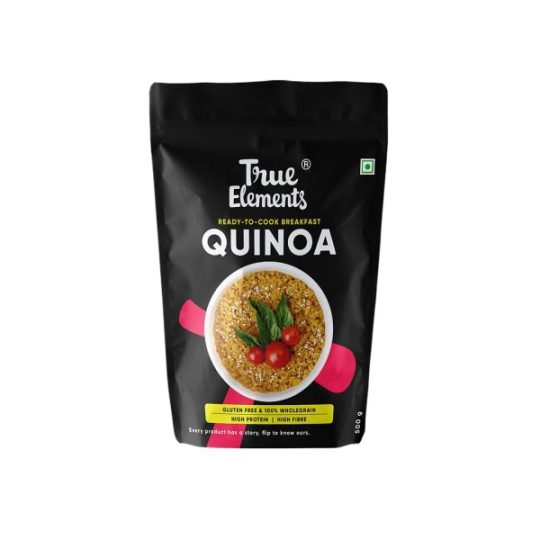
True Elements Quinoa 500 gm
True Elements Quinoa is composed of vitamins, minerals, and nutrients required by the body to carry out its functions. That provides all the essential amounts of nutrients required. It helps boost immune function.
https://www.cureka.com/shop/nutrition/weight-loss-foods/quinoa/true-elements-quinoa-500-gm/
#Quinoa#Superfood#Whole Grain#Protein Source#Gluten-Free#Vegan#Nutrient-Dense#Healthy Eating#Balanced Diet#Plant-Based Protein#Versatile Ingredient#High Fiber#Antioxidants#Essential Nutrients#Iron-Rich#Calcium Source#Omega-3 Fatty Acids#Cooking Ingredient#Ancient Grain#Sustainably Sourced
0 notes
Text
Exploring the Rise of Plant-Based Diets: Health, Environment, Ethics
In recent years, there has been a notable shift towards plant-based diets, driven by concerns over health, environmental sustainability, and ethical considerations. As more people embrace the benefits of plant-based eating, this dietary trend is reshaping the food industry and influencing consumer choices. In this blog, we delve into the reasons behind the rise of plant-based diets and their implications for health, the environment, and ethics.
The Health Benefits of Plant-Based Diets
One of the primary reasons for the increasing popularity of plant-based diets is their potential health benefits. Numerous studies have shown that diets rich in fruits, vegetables, whole grains, and plant-based proteins can lower the risk of chronic diseases such as heart disease, diabetes, and certain types of cancer. Plant-based diets are typically lower in saturated fats and cholesterol, while also providing essential nutrients like fiber, vitamins, and antioxidants. By adopting a plant-based diet, individuals can improve their overall health and well-being, leading to a higher quality of life and reduced healthcare costs.
Environmental Sustainability
Beyond personal health, the environmental impact of food production has become a significant concern for many consumers. Animal agriculture is a leading contributor to greenhouse gas emissions, deforestation, water pollution, and habitat destruction. In contrast, plant-based diets have a significantly lower environmental footprint, requiring fewer resources such as land, water, and energy. By reducing the demand for animal products and transitioning to plant-based alternatives, individuals can help mitigate climate change and promote environmental sustainability for future generations.
Ethical Considerations
For some, the decision to adopt a plant-based diet is driven by ethical considerations regarding animal welfare. The intensive farming practices associated with animal agriculture often raise concerns about animal cruelty, confinement, and slaughter. By choosing plant-based foods, individuals can align their dietary choices with their values of compassion and respect for all living beings. This ethical stance extends beyond personal health and environmental concerns, advocating for a more humane and compassionate approach to food production and consumption.
The Growing Availability of Plant-Based Options
As the demand for plant-based foods continues to rise, food manufacturers, restaurants, and retailers are responding by expanding their plant-based product offerings. From plant-based meat alternatives and dairy-free milk to vegan-friendly snacks and desserts, there is now a wide range of plant-based options available to consumers. This increased availability makes it easier than ever for individuals to incorporate more plant-based foods into their diets, regardless of their dietary preferences or restrictions.
Promoting Plant-Based Diets through Digital Marketing
At Gsinfotechvis, we recognize the importance of promoting plant-based diets as part of our commitment to health, sustainability, and ethical values. Through our digital marketing efforts, we aim to raise awareness of the benefits of plant-based eating and empower consumers to make informed dietary choices. From engaging social media campaigns to informative blog content and targeted advertising, we leverage digital platforms to inspire and educate our audience about the positive impacts of plant-based diets on health, the environment, and ethics.
Conclusion: Embracing the Plant-Based Movement
In conclusion, the rise of plant-based diets reflects a growing awareness of the interconnectedness between personal health, environmental sustainability, and ethical values. By embracing plant-based eating, individuals can improve their health, reduce their environmental footprint, and contribute to a more compassionate food system. At Gsinfotechvis, we are proud to support the plant-based movement through our digital marketing initiatives, inspiring positive change and promoting a healthier, more sustainable future for all. Join us in embracing the power of plants and reshaping the way we eat for the better.
0 notes